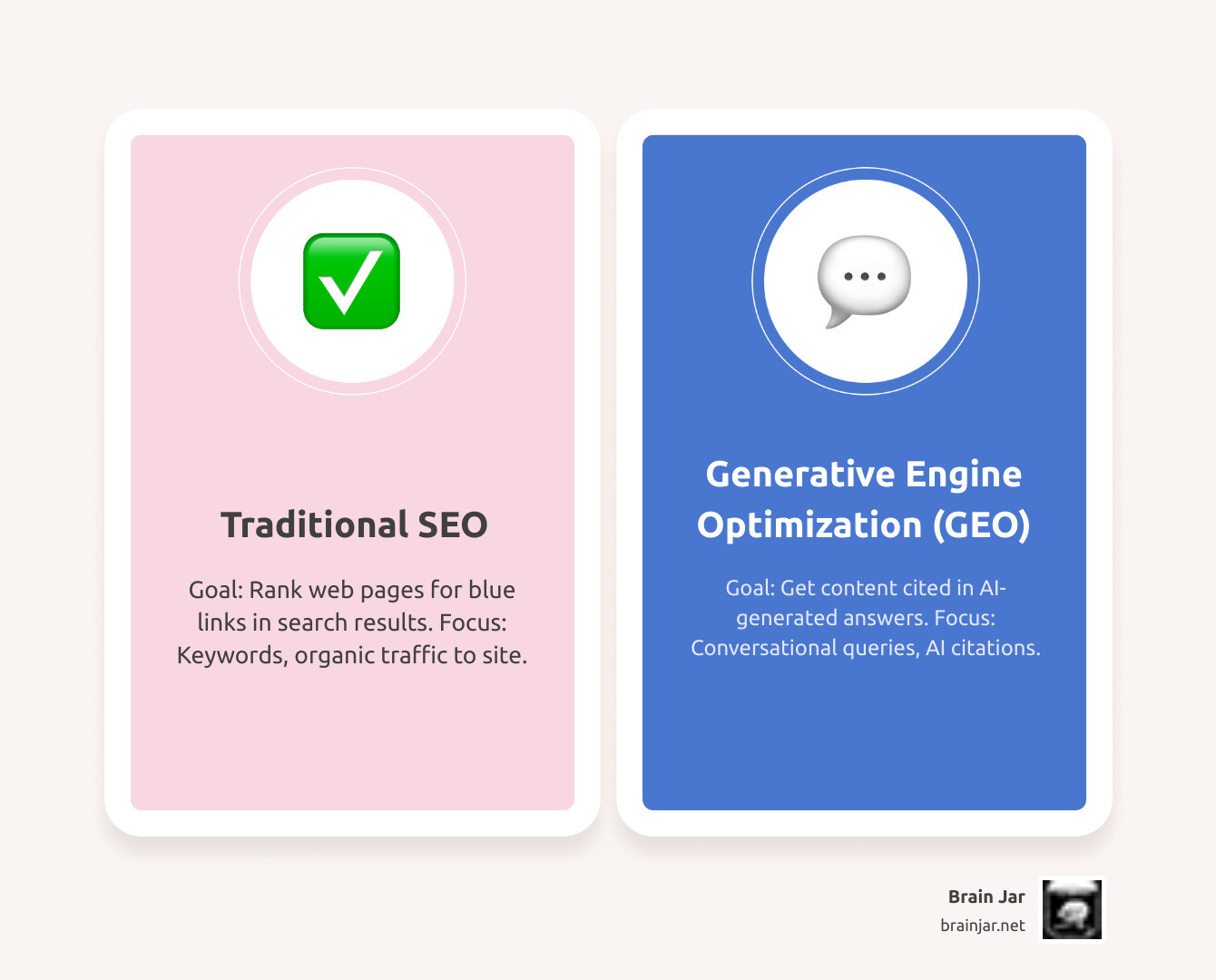The Dawn of AI-Powered Search: Why Your Business Needs to Evolve Now

What is generative engine optimization geo is one of the most critical questions in digital marketing today. As artificial intelligence transforms how people find information, businesses must adapt or risk becoming invisible.
Generative Engine Optimization (GEO) is the practice of optimizing content to appear in AI-generated search responses from platforms like ChatGPT, Google’s AI Overviews, and Perplexity. Unlike traditional SEO, which aims to rank web pages, GEO focuses on getting your content cited and referenced within AI-powered answers. This means optimizing for AI citations, structuring content for both humans and AI, and prioritizing quality and authority over keyword density.
The shift is happening fast. Gartner predicts traditional search volume will drop by 25% by 2026, while ChatGPT now has over 180.5 million monthly users. This represents a fundamental change in how your customers find and interact with information.
The old playbook of stuffing keywords and building backlinks is no longer enough. AI engines look for authoritative content with clear structure, credible sources, and direct answers to user questions. They synthesize information from multiple sources, and if your content isn’t optimized for this new reality, you’re missing out.
Understanding what is generative engine optimization geo is essential for helping businesses maintain visibility as AI reshapes search. In this guide, lets walk through what you need to know to adapt your marketing strategy for this AI-driven future.

What is Generative Engine Optimization (GEO) and Why Does It Matter?
What is generative engine optimization geo becomes clear when you understand this shift: it’s about creating content that AI engines like ChatGPT, Gemini, and AI Overviews love to cite. Instead of fighting for the top spot on a results page, GEO is about becoming the trusted source that Large Language Models (LLMs) turn to when crafting their responses.
When someone asks an AI about your industry, you want to be the expert voice they quote. The numbers tell a compelling story: 79% of consumers are expected to adopt AI-powered search within the next year. A foundational study on GEO from leading researchers revealed that well-optimized content sees 30-40% better visibility in AI responses. The secret? Content that includes citations, expert quotations, and relevant statistics performs significantly better.
The Shift in Search Behavior
The days of typing “pizza near me” and scrolling through ten blue links are fading. Today’s users engage in conversational queries, asking full questions like, “What should I look for when choosing a marketing agency for my small business?”
They expect direct answers, leading to more zero-click searches where users get information from the AI response itself. This can lead to reduced organic traffic for traditional websites but creates a new opportunity for brand authority. Users are also having deeper search sessions with AI, engaging in back-and-forth conversations to fully understand topics. This behavioral shift is why our Ad Campaign Management strategies now incorporate GEO principles to meet users where they are searching.
How Generative Engines Work
Understanding how AI engines operate explains why GEO matters. These systems don’t just find information—they synthesize it.
The process starts with Natural Language Processing (NLP), where AI interprets the user’s intent, not just their words. Next comes data synthesis, where the AI analyzes thousands of sources, identifies patterns, and creates a new response custom to the question.
Content summarization happens in real-time, with AI engines pulling key facts and statistics from various sources. Many platforms now include source citation, giving credit to the original creators. This is where GEO shines—when your content is well-structured and authoritative, you become the cited expert. These engines also use pattern recognition to understand context and nuance, which is why businesses need content that speaks directly to specific user needs.
To see how AI can transform other aspects of your business, explore our AI-powered tools that help streamline sales and customer engagement.
SEO vs. GEO: A New Paradigm for Digital Marketing
For over two decades, SEO was the gold standard for getting found online. Now, what is generative engine optimization geo is emerging as a critical complement to everything we’ve been doing. This isn’t about throwing out years of SEO work; it’s about evolving your strategy for a world where AI engines are primary sources of information.
Here’s how these two approaches stack up:
| Feature | Traditional SEO | Generative Engine Optimization (GEO) |
|---|---|---|
| Primary Goal | Rank web pages high on SERPs | Get content cited/referenced in AI-generated answers |
| Output | List of blue links (web pages) | Synthesized, conversational answers (often with sources) |
| Keywords | Short, specific keywords, keyword density | Natural language, conversational queries, long-tail questions |
| Content Focus | Keyword optimization, page relevance | Clarity, authority, structure, direct answers, E-E-A-T |
| User Action | Click to website | Consume AI answer, potentially click citation for depth |
| Metrics | Organic traffic, keyword rankings, CTR, conversions | Reference rate, brand mentions in AI, sentiment, referral traffic |
| Foundation | Links, technical SEO, user experience | Language, content structure, factual accuracy, credibility, schema |
Key Similarities: The Enduring Principles of Quality
The good news is that many core SEO principles are more important than ever for GEO. E-E-A-T (Experience, Expertise, Authoritativeness, Trustworthiness) remains critical, as AI engines are designed to provide reliable information from credible sources. High-quality, comprehensive content, a deep understanding of user intent, strong brand authority, and excellent technical website health are all foundational elements that benefit both SEO and GEO.
What is the core difference between SEO and what is generative engine optimization geo?
The fundamental difference is where your content appears in the user’s journey. With traditional SEO, success means getting a click-through to your website. With GEO, success means getting a citation within the AI’s response itself. Your expertise becomes woven into the answer, positioning your brand as an authority even if the user never visits your site directly. This shifts the optimization focus from keywords and backlinks to clarity, structure, and factual accuracy. The metrics also evolve from tracking traffic to monitoring brand references and sentiment in AI responses. This evolution is why our expert SEO services now integrate these new strategies.
Integrating GEO with Your Existing SEO Strategy
You don’t need to choose between SEO and GEO—they work best together. A unified content strategy should create comprehensive, well-researched content that serves both human readers and AI engines. Expand your keyword research to include conversational queries and natural language questions. Technical optimization, especially schema markup, benefits both traditional search and AI crawlers. Finally, your existing domain authority from years of SEO work gives you a significant advantage, as AI engines prioritize information from established, trustworthy sources. This hybrid approach future-proofs your marketing efforts, ensuring your brand stays visible as search technology evolves.
Core Strategies for Mastering AI-Powered Visibility

Getting noticed by AI engines isn’t about gaming the system; it’s about creating valuable content that both humans and machines can easily understand. The shift to what is generative engine optimization geo means being more thoughtful about how we craft and present our content, as AI tries to understand meaning, context, and credibility.
Create High-Quality, Relevant, and Authoritative Content
AI engines are sophisticated and can spot thin, generic content. They are trained to recognize what makes content truly valuable.
- In-depth analysis is your secret weapon. Dive deep into topics instead of skimming the surface. Comprehensive coverage helps AI provide complete answers.
- Citing credible sources is crucial. The foundational GEO study showed that including citations, quotations, and statistics can improve visibility in AI responses by 30-40%.
- Adding relevant statistics transforms your content from opinion to a fact-based resource that AI can synthesize and reference.
- Expert quotations add another layer of authority. Testing shows that AI-driven search tends to pull clear snippets and well-organized information, especially when it comes from recognized experts.
- Comparative content performs exceptionally well. Research shows that comparative listicles are frequently cited by large language models.
At Brain Jar, we’ve seen how this approach transforms visibility. Check out our Blog for content ideas that serve both human readers and AI engines.
Structure Content for Human Readers and AI Scanners
Think of content structure as a roadmap for both users and AI. Clear signposts and logical organization are key.
- Use clear, descriptive headings (H2s, H3s) to create a table of contents.
- Write short, focused paragraphs, with each one covering a single main idea.
- Use lists and formatting strategically to present information in a structured way that’s easy for AI to extract.
- Follow the inverted pyramid approach by putting your most important information first.
- Prioritize readability. Use tools like the Hemingway App to ensure your writing is clear and concise. AI models prefer direct, unambiguous language.
What are the best practices for what is generative engine optimization geo?
Success comes from combining content excellence with AI-friendly practices. The best practices are evolutionary improvements to what good content creators have always done.
- Write in natural, conversational language.
- Answer user questions comprehensively, anticipating follow-ups.
- Use structured data (Schema) to give AI explicit context.
- Build topical authority by creating interconnected content on a subject.
- Foster user engagement and social proof through reviews and comments.
Leverage Schema Markup and Structured Data
Schema markup adds helpful labels to your content, making it easier for AI to find and understand. It provides explicit context that removes guesswork for AI engines.
FAQPage schema is particularly powerful for GEO because it directly maps to how people ask questions. When you structure your FAQs with proper schema, you’re pre-packaging answers in the format AI engines prefer. Google’s guide to structured data provides comprehensive information on implementation. Product and Q&A schema are also valuable for commercial content and user questions.
For a complete reference, explore all data types at schema.org. The investment in proper structured data pays dividends across all forms of search.
Measuring Impact and Navigating the Future of Search

The challenge with measuring what is generative engine optimization geo success is that traditional metrics like page views tell only part of the story. When your goal is to be cited by AI rather than clicked on, you need different measuring tools.
How to Measure the Success of Your GEO Efforts
Measuring GEO effectiveness requires a shift from traffic volume to influence and authority within AI responses.
- Track brand mentions: Use brand monitoring tools to see how often your brand appears in AI-generated responses.
- Analyze sentiment: Specialized sentiment analysis tools can reveal if your brand is being framed positively, negatively, or neutrally.
- Measure share of voice in AI: See how often your brand is referenced compared to competitors for industry-related queries.
- Monitor citations: For platforms like Perplexity AI that provide explicit citations, tracking these references shows when your content is deemed authoritative.
- Review referral traffic from AI: While volume may be lower, this traffic can be high-quality. Data shows that AI-driven traffic can convert at impressive rates as users are often further down the decision funnel.
The Benefits of Adopting GEO for Your Business
Embracing GEO offers significant advantages. It leads to increased brand visibility in influential new search environments. When AI engines cite your content, they are validating your expertise and positioning your brand as a trusted authority. Early adoption provides a competitive advantage, establishing your brand in a space that will become more crowded. The process also naturally improves user experience and often leads to higher-quality traffic from more informed users.
The Future of GEO and Digital Marketing
The evolution of GEO is just beginning. Key future trends include:
- Hyper-personalization: AI will tailor responses based on individual user history and context.
- Voice and visual search: Optimization will need to expand beyond text to include spoken queries and image recognition.
- Proactive and multimodal AI: AI will anticipate user needs and integrate text, images, and video into seamless search experiences.
To stay ahead, businesses need comprehensive digital strategies. Our Social Media Management Plan helps brands steer these shifts while maintaining a strong digital presence.
Common Misconceptions and Challenges
One of the biggest myths is that SEO is dead. In reality, GEO is an evolution, not a replacement. Traditional SEO builds the foundational authority that AI engines rely on. It’s also important to remember that local SEO remains largely unaffected for searches tied to maps and real-world proximity.
Ongoing challenges include AI hallucinations and bias, which make it crucial for your content to be factually accurate and clear. The lack of transparency in AI algorithms requires a focus on fundamental quality principles rather than trying to game a system. As more businesses adopt GEO, content saturation will make unique insights even more critical. Finally, human oversight remains essential to ensure factual accuracy and genuine user value.
Frequently Asked Questions about GEO
As we help businesses steer this new landscape, certain questions about what is generative engine optimization geo come up repeatedly. Here are the most common concerns.
Is GEO going to replace SEO?
No, GEO is not going to replace SEO. Think of it as an evolution and a complement. SEO builds the foundational authority, technical health, and indexability for your website. GEO then leverages that foundation to get your content cited in AI-generated answers.
A successful digital strategy today requires integrating both. You still need a strong SEO foundation for AI engines to find and crawl your content in the first place. By adding GEO, you optimize for visibility in both traditional search results and AI-powered conversational responses.
What is the single most important factor for GEO?
If there’s one core element, it’s creating high-quality, well-structured, and authoritative content that directly answers user questions.
This means your content must be accurate and genuinely helpful (quality), easy for both humans and AI to parse with clear headings and lists (structure), and backed by credible sources, data, and expertise (authority). Because AI aims to provide comprehensive responses, your content should anticipate and answer questions thoroughly.
How can I start with GEO today?
You can begin improving your content for generative AI right now. Here’s a simple way to start:
- Audit your best content. Identify your top-performing articles that already get good engagement. These are perfect candidates for GEO optimization.
- Improve structure and add credibility. Add clear headings, use lists where appropriate, and integrate relevant statistics or expert quotes with citations to boost trustworthiness.
- Implement basic schema markup. Start with simple but powerful types like FAQPage schema for Q&A articles or Article schema for blog posts. This gives AI engines explicit context about your content.
After making these changes, test your progress. Use AI platforms to search for relevant topics and see if your content appears in citations. AI search analysis tools can also help you benchmark where you stand.
Conclusion: Embracing the Future of Search with GEO
The digital marketing world is in the midst of a fundamental shift in how people find and consume information. Understanding what is generative engine optimization geo is about recognizing that the future of search is more conversational, intelligent, and human-like.
We’ve moved from typing fragmented keywords to having natural conversations with AI, asking complete questions and expecting thoughtful answers. This is the new reality of how your customers will find you.
The path forward requires balance and integration. Traditional SEO is not dead; it provides the essential foundation of authority and credibility that GEO builds upon. Your success depends on creating content that serves both humans and AI engines, which means writing with clarity, structuring information logically, and always focusing on providing genuine value.
The opportunity is enormous. Early adopters of GEO are already building trust and visibility in ways that were impossible just a few years ago. The businesses that adapt now will gain a significant advantage.
As a media marketing agency, Brain Jar helps businesses steer this exciting new landscape by blending cutting-edge GEO tactics with proven SEO strategies. The future belongs to brands that can be trusted sources for both people and machines—and we’re here to help you become one of them.
Start optimizing for the future of search with our SEO Services Gold Plan.
